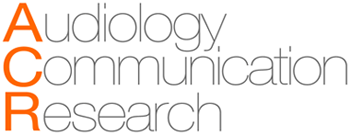Here we present the second issue of Audiology - Communication Research (ACR) in 2015.
Still aiming the improvement of this journal, whose greatest challenge is its indexing in databases such as MEDLINE and ISI, we are currently carrying out an expansion in the associate editors board. Considering the multiple fields within Speech, Language and Hearing sciences, the role of the associate editors is important and necessary to expedite the editorial process. We are still waiting on the impact index of the ACR so we can apply to other databases.
We would like to take the opportunity to address an issue that seems to be common to several other Speech, Language and Hearing sciences’ journals in Brazil: the researches’ lack in originality, novelty and importance. This problem has made us reflect, not only among us but also in discussions with our partners editors of other national journals, and this has been a subject of debate in several forums like CNPq, FAPESP and even CAPES.
Every work that has not been published before is original, however this is not sufficient to be considered novel. Novelty implies the unveil of important questions in the field, and the presentation of new perspectives to approach a particular problem. It is the means by which science expands. Obviously, every novel work would be important, however, the “importance” of a research is a utilitarian and subjective concept that introduces other requirements to the selection criteria that is being used to analyze it. In fact, by this interpretation, an original and novel research may still be refused for several reasons, including that its publication is not in the interest of the journal (Bicas, 2008).
In this issue, 13 articles and an invited editorial are being published. The first four are from the field of Audiology: one about computerized dynamic posturography for the assessment of body balance in individuals with vestibular dysfunction, one that approaches the profile and work satisfaction among professionals of hearing care health network, another one related to the audiological profile of children under oncological treatment, and the last one is the presentation of a practical hearing aid skills test (PHAST), with results at the time of fitting and comparison between evaluators.
Following, we present an article that approaches the effect of the delayed auditory feedback in stuttering.
Two articles are from the field of Voice. The first one is on the acoustic voice analysis, presenting the effects of an audio-visual training for speech therapy undergraduates, and the second one regards the quality of life in voice, perceptual-auditory assessment and voice acoustic analysis of teachers with vocal complaints
The last four articles are from the field of Orofacial Myofunctional disorders, and they approach the socio-economic aspects and mothers knowledge about breastfeeding, the quantitative analysis of oral and pharyngeal transit time in genetic syndromes, the orofacial myofunctional characterization in Parry-Romberg syndrome, and the influence of masticatory function on swallowing of healthy elderly.
We also present a systematic review on functional magnetic resonance imaging and swallowing, and a case report on the impact of discursive linguistic activities in promoting the health of elderly people in a long-term care institution.
Finally, we have an invited editorial that approaches the event-related potentials in clinical research.
Our intent is to introduce innovative articles that are of excellence in the field, and that comprises all lines of research in Speech, Language and Hearing sciences. We are sure that every article in this issue will be greatly appreciated by the readers.
We further reinforce the request that everyone - authors and reviewers - meet the proper deadlines, so we are able to maintain our indexing to Scielo, and improve our chances of indexing to MEDLINE.
Eliane Schochat e Kátia de Almeida
Editors of Audiology - Communication Research
-
Erratum
In the editorial doi number http://dx.doi.org/10.1590/S2317-64312015000200000001 , published in journal Audiology – Communication Research, 20(2):v-vi , page vi :It includs:“ReferenceBicas HEA. Ineditismo, originalidade, importância, publicidade, interesse e impacto de artigos científicos. Arq Bras Oftalmol. 2008;71(4):473-4.”
REFERÊNCIAS
- Bicas HEA. Ineditismo, originalidade, importância, publicidade, interesse e impacto de artigos científicos. Arq Bras Oftalmol. 2008;71(4):473-4.
Publication Dates
-
Publication in this collection
Apr-Jun 2015

